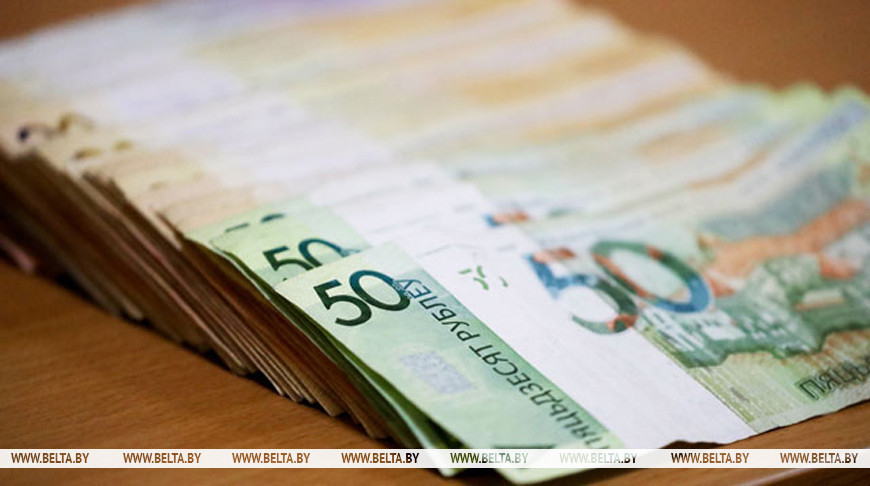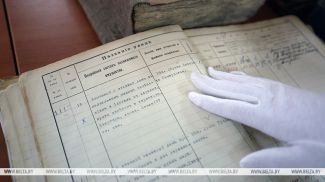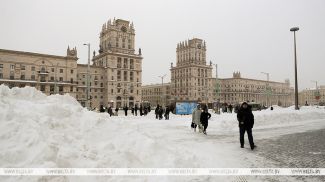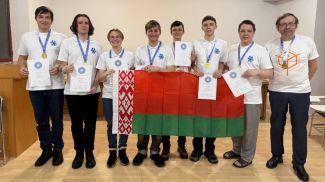
MINSK, 20 December (BelTA) – A new documentary on the ONT TV channel has exposed the scheme that “human rights” foundations use to make money on “political prisoners”, BelTA has learned.
The scheme is simple. People posing as human rights activists recognize random convicts as political prisoners and bribe Western curators to lobby for the allocation of financing for them. This money goes to corrupt foundations that keep almost all the funds for themselves, and give the remaining little to couriers who are supposed to get this money to Belarusian applicants. Couriers also get their share, thus, just several hundred euros is left to be distributed among dozens of people. This is done to create the impression of the integrity of this scheme.
The first on the list is the DissidentBy foundation. The day before, the TV channel told a story of Anastasia Kononovich, whose husband (Cheslav Kononovich) was sentenced to five years in prison for donations to the Kalinovsky Regiment. “Human rights” foundations claimed to have allocated money for Cheslav. But neither he nor his wife Anastasia were aware of it.

Anastasia gave her phone to the journalists to call the coordinator of the DissidentBy foundation, Marina Kosinerova. The native of Bobruisk is under criminal prosecution, and her Telegram account name is Mary.

The standard scheme of “assistance” from all “foundations” requires opening an account in a foreign bank, but relatives of “political prisoners” rarely have an opportunity to do this. There is another option - to transfer money to a bank card from a bank terminal in Belarus. Everything is supposedly anonymous and it will look like a recipient transferred it to their own account. But there is a caveat: in this case, recipients get a handout of just Br100. And this is supposed to be enough to cover legal expenses, and packages to inmates, and gifts for inmates’ children. But, as it turned out, Kosinerova's reports show completely different amounts.

Anonymity is a myth. Kosinerova's courier was identified as Yelena Piskur.
As a result, Anastasia Kononovich (represented by journalists) received a total of Br500 in five tranches. At the same time, Kosinerova asked to provide a report for her donors that Anastasia received Br7,100. It is unknown who pocketed the difference: Kosinerova, Piskur, or someone else.
Journalists wrote to other funds on behalf of Anastasia. BySol responded that if there is no Paysera card, that is, a foreign bank account, they will not be able to help. Another foundation, ByHelp, allegedly sent money, but Anastasia did not get anything. The Politzek initiative sent Anastasia a check that she received €900, which she did not.
Anastasia Kononovich allegedly received thousands of euros, but in reality she received breadcrumbs. Yet, one organization helped the wife of the “political prisoner”. Olga Zazulinskaya, the coordinator of the “Country for Life” foundation, sent her Br1,050. But she did not ask for a report, which implies that she herself does not report to anyone.
Meanwhile, in the course of several months, all these “human rights” foundations approached Anastasia 84 times asking her to provide her or her husband’s identity documents.
One of the former couriers for the ByHelp foundation is Lyubov Dragel. “If only I could turn back time, I would not have done this,” she admits.
Aleksei Leonchik, the head of the ByHelp foundation, never transferred millions or hundreds of thousands to one or two assistants. There were several dozen top-level intermediaries in Belarus, and they regularly changed to conceal their whereabouts. The intermediaries split the amounts into smaller batches, up to €5,000, and transferred them to dozens of couriers. Never meeting them in person, they sent money either by post or made caches, like drug couriers. The recipients of the money, all sorts of criminals, their lawyers and relatives, were called “applicants” in the scheme. They operated in forests or in single-family neighborhoods, where couriers, such as Lyubov Dragel, left caches following Leonchik's guidelines - the money was hidden either in a book, or in a plastic bag, or in some other wrapper.
JIRA, a project management software product, was used to collect the “applicants’” data, distribute orders among couriers and report on their fulfillment. At the same time, information was leaked from the database. A part of the ByHelp database listing all the recipients was shown on TV. It was not a problem to identify the couriers - Dmitry Kovalev, Sergei Kardash and Aleksei Kubrakov. After searches all three of them were put in pretrial detention facilities. Their coordinator Aleksandr Chakhovsky, the ex-husband of singer Margarita Levchuk, will be sentenced in absentia, since he fled to Poland long ago.
The scheme is simple. People posing as human rights activists recognize random convicts as political prisoners and bribe Western curators to lobby for the allocation of financing for them. This money goes to corrupt foundations that keep almost all the funds for themselves, and give the remaining little to couriers who are supposed to get this money to Belarusian applicants. Couriers also get their share, thus, just several hundred euros is left to be distributed among dozens of people. This is done to create the impression of the integrity of this scheme.
The first on the list is the DissidentBy foundation. The day before, the TV channel told a story of Anastasia Kononovich, whose husband (Cheslav Kononovich) was sentenced to five years in prison for donations to the Kalinovsky Regiment. “Human rights” foundations claimed to have allocated money for Cheslav. But neither he nor his wife Anastasia were aware of it.

Anastasia gave her phone to the journalists to call the coordinator of the DissidentBy foundation, Marina Kosinerova. The native of Bobruisk is under criminal prosecution, and her Telegram account name is Mary.

The standard scheme of “assistance” from all “foundations” requires opening an account in a foreign bank, but relatives of “political prisoners” rarely have an opportunity to do this. There is another option - to transfer money to a bank card from a bank terminal in Belarus. Everything is supposedly anonymous and it will look like a recipient transferred it to their own account. But there is a caveat: in this case, recipients get a handout of just Br100. And this is supposed to be enough to cover legal expenses, and packages to inmates, and gifts for inmates’ children. But, as it turned out, Kosinerova's reports show completely different amounts.

Anonymity is a myth. Kosinerova's courier was identified as Yelena Piskur.
As a result, Anastasia Kononovich (represented by journalists) received a total of Br500 in five tranches. At the same time, Kosinerova asked to provide a report for her donors that Anastasia received Br7,100. It is unknown who pocketed the difference: Kosinerova, Piskur, or someone else.
Journalists wrote to other funds on behalf of Anastasia. BySol responded that if there is no Paysera card, that is, a foreign bank account, they will not be able to help. Another foundation, ByHelp, allegedly sent money, but Anastasia did not get anything. The Politzek initiative sent Anastasia a check that she received €900, which she did not.
Anastasia Kononovich allegedly received thousands of euros, but in reality she received breadcrumbs. Yet, one organization helped the wife of the “political prisoner”. Olga Zazulinskaya, the coordinator of the “Country for Life” foundation, sent her Br1,050. But she did not ask for a report, which implies that she herself does not report to anyone.
Meanwhile, in the course of several months, all these “human rights” foundations approached Anastasia 84 times asking her to provide her or her husband’s identity documents.
One of the former couriers for the ByHelp foundation is Lyubov Dragel. “If only I could turn back time, I would not have done this,” she admits.
Aleksei Leonchik, the head of the ByHelp foundation, never transferred millions or hundreds of thousands to one or two assistants. There were several dozen top-level intermediaries in Belarus, and they regularly changed to conceal their whereabouts. The intermediaries split the amounts into smaller batches, up to €5,000, and transferred them to dozens of couriers. Never meeting them in person, they sent money either by post or made caches, like drug couriers. The recipients of the money, all sorts of criminals, their lawyers and relatives, were called “applicants” in the scheme. They operated in forests or in single-family neighborhoods, where couriers, such as Lyubov Dragel, left caches following Leonchik's guidelines - the money was hidden either in a book, or in a plastic bag, or in some other wrapper.
JIRA, a project management software product, was used to collect the “applicants’” data, distribute orders among couriers and report on their fulfillment. At the same time, information was leaked from the database. A part of the ByHelp database listing all the recipients was shown on TV. It was not a problem to identify the couriers - Dmitry Kovalev, Sergei Kardash and Aleksei Kubrakov. After searches all three of them were put in pretrial detention facilities. Their coordinator Aleksandr Chakhovsky, the ex-husband of singer Margarita Levchuk, will be sentenced in absentia, since he fled to Poland long ago.













